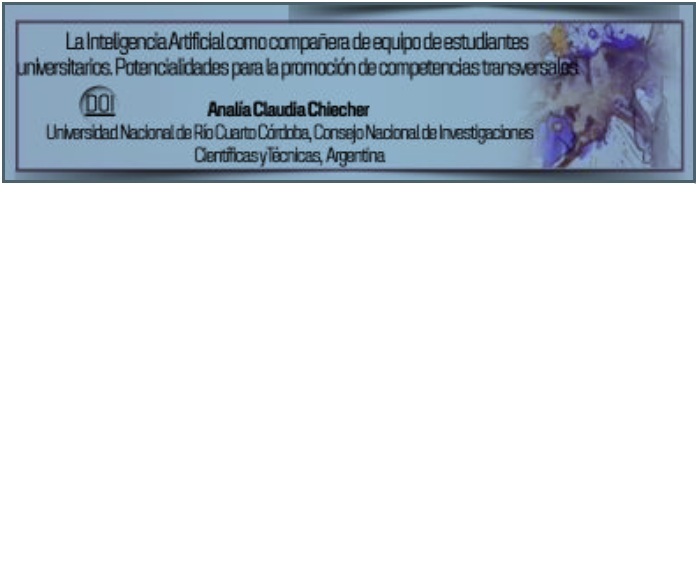Inteligência Artificial como companheira de equipe para estudantes universitários. Potencial para promover competencias transversais.
DOI:
https://doi.org/10.19137/praxiseducativa-2025-290204Resumo
O artigo apresenta uma abordagem inovadora em relação ao uso da inteligência artificial (IA) no ensino superior, focando no seu papel como companheiro de equipe em tarefas de grupo. Embora a IA seja amplamente utilizada para personalizar a aprendizagem e automatizar processos, poucos estudos relatam sua atuação como colaborador ativo em atividades acadêmicas. É descrita uma tarefa acadêmica na qual um assistente virtual baseado em IA colabora com os alunos na organização do grupo, reconhecimento de pontos fortes, distribuição de funções, planejamento de tempo e revisão do produto final. Destaca-se o potencial da tarefa para promover competências transversais como o trabalho em equipa, a gestão do tempo e a utilização de ferramentas digitais. São incluídos exemplos de interações entre alunos e IA, destacando o potencial do modelo para enriquecer a aprendizagem e o desenvolvimento de competências transversais. Sugere-se pesquisas futuras para avaliar sua eficacia.
Downloads

Publicado
Edição
Seção
Licença
Copyright (c) 2025 Analía Claudia Chiecher

Este trabalho está licenciado sob uma licença Creative Commons Attribution-NonCommercial-ShareAlike 4.0 International License.
Aviso de direitos autorais
Comitê Editorial Revista Práxis Educativa:
Declaro que sou o autor do artigo intitulado (nome do artigo), que o mesmo é original e de minha autoria e que não foi publicado anteriormente em qualquer outro formato ou meio. Declaro saber que a revista não me cobrará nenhum tipo de taxa em hipótese alguma, nem receberei qualquer tipo de remuneração monetária.
Caso seja aceito para publicação na Práxis Educacional, autorizo a referida revista a publicá-lo digitalmente e a divulgá-lo em suas redes sociais.
Se o trabalho for publicado, aderi à licença Creative Commons denominada "Atribuição - Compartilhamento Não Comercial pela mesma Licença CC BY-NC-SA", por meio da qual é permitido copiar, reproduzir, distribuir, comunicar publicamente o trabalho e gerar trabalhos derivados , desde que o autor original seja citado e reconhecido. Esta licença está em uso desde setembro de 2018. Em 2016 foi aderido ao CC BY NC ND 4.0; e nos anos de 2017 e 2018 (janeiro-agosto) CC BY NC 4.0.
Esta licença CC BY-NC-SA Share Alike não permite, entretanto, o uso comercial da obra. Como autor, a revista poderá estabelecer acordos adicionais para a distribuição não exclusiva da versão do trabalho publicado na revista, permite-me autoarquivar os artigos publicados, na sua versão post-print, em repositórios institucionais, temáticos , páginas web pessoais ou qualquer outro uso relevante. com o reconhecimento de ter sido publicado pela primeira vez nesta revista.
SA Práxis Educacional adere à DORA (Declaração sobre Avaliação de Pesquisa) assinada em São Francisco, Califórnia, em 16 de dezembro de 2012, e à Declaração do México (Declaração Conjunta LATINDEX - REDALYC - CLACSO - IBICT).














_(1)2.png)


3.png)











_(2).png)






2.jpg)









